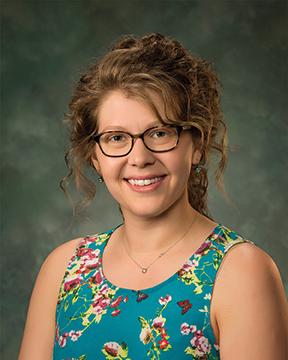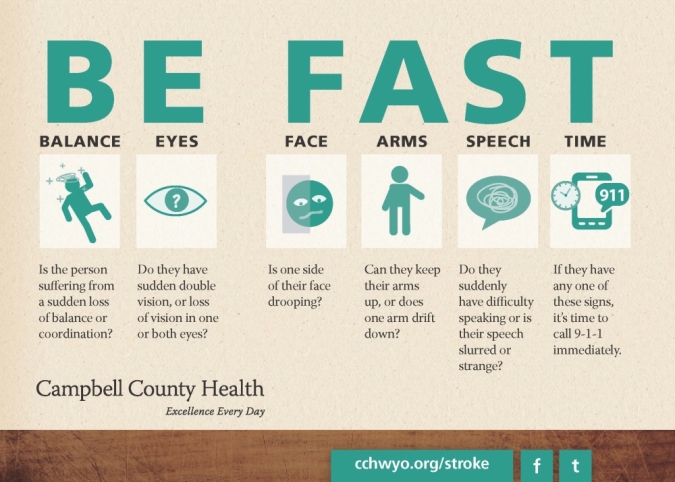Speech therapy at CCH helps stroke survivor regain independence
It's important to know the risk factors and signs and symptoms of a
stroke, but it's also helpful to know the rehabilitation options stroke
survivors may need to fully recover. Suzanne Wollman is a shining example
of how receiving the right care after a stroke can help a patient regain
their independence.
On Saturday afternoon, Suzanne was watching after her youngest granddaughter,
when her daughter, Rebecca, started to notice that something was different
about her mom—Suzanne was having trouble moving and speaking with
them. They immediately called 911. Suzanne was transported by ambulance to
Campbell County Memorial Hospital, and then life-flighted to
Wyoming Medical Center. There they learned that Suzanne suffered a left-hemisphere stroke—the
side of the brain that controls the ability to speak and understand language
for most people.
When Suzanne was discharged from the hospital, her doctor suggested that
she spend a few weeks in
Elkhorn Valley Rehabilitation Hospital in Casper recovering from her stroke. While she was there, she and her
husband, Craig, realized that she needed additional help recovering, especially
with her speech. They began by searching the internet, and were pleasantly
surprised to learn that there was a
speech and language therapist right in Gillette.
“Before I started therapy, I couldn’t even say, ‘cup
of coffee,’” says Suzanne. “I could picture it in my
mind, but I couldn’t say it. The words just wouldn’t come
out right.”
When you don’t have a voice, you feel isolated
 According to
Whitney White, MA, CCC-SLP, Speech and Language Therapist at Campbell County Health
Rehabilitation Services, Suzanne was experiencing aphasia and apraxia as a result of her stroke.
According to
Whitney White, MA, CCC-SLP, Speech and Language Therapist at Campbell County Health
Rehabilitation Services, Suzanne was experiencing aphasia and apraxia as a result of her stroke.
“Suzanne had a double whammy,” says Whitney. “People
who have aphasia may have difficulty speaking and finding the ‘right’
words to complete their thoughts. With apraxia, a person finds it hard
to move their mouth and tongue to speak. Suzanne could picture what she
wanted to say, but she couldn’t find the right words, or physically
say them.”
According to the
Stroke Association, it’s estimated that approximately one third of people will experience
some level of communication difficulties after a stroke. A person’s
ability to communicate includes speaking, understanding what others are
saying, reading, writing and using numbers. Difficulties with communication
can make it harder for these individuals to get information, as well as
impact their social relationships, independence and self-confidence.
Suzanne started therapy with Whitney before Christmas 2016—attending
three, 60-minute sessions each week. The sessions are filled with drills
to help the patient retrain their word retrieval. These drills may consist
of the therapist starting a sentence with a prompt that the patient will
fill in the blanks, or even a question for the patient to solve. For example:
- Prompt: “If the kitchen timer goes off, then…” says Whitney.
- Answer: “It means the food is done,” replies Suzanne.
- Question: “Pete is taller than Dave, but shorter than Chuck. Who
is the tallest?” asks Whitney.
- Response: “Chuck,” replies Suzanne.
After each session, Whitney sent Suzanne home with tools and worksheets
to practice with before she returned for her next session. According to
Whitney, Suzanne has responded incredibly to her therapy—she’s
attending therapy once a week now, and is finding her words with greater
ease. Suzanne returned to her job at
Joy Global in February 2017, and she’s even back to cooking for her family,
something she enjoyed immensely before her stroke.
“She’s highly motivated and does a lot of work at home to improve
her speech, which proves if you put in the effort you will see the results,”
says Whitney.
Suzanne describes her experience with Whitney as excellent. “Whitney
has helped me so much. She makes me work for it, but it’s paid off.
I’m grateful for her help,” says Suzanne.
To learn more about the Speech Therapy services available at Campbell County
Health, visit
www.cchwyo.org/speech or call 307.688.8000. A physician referral is recommended to receive rehabilitation
care such as speech therapy.
Warning signs of a stroke
A stroke is caused by an interruption of the blood supply to the brain.
Knowing the signs and symptoms of stroke is essential, and can help to
save a life. The acronym BE FAST is a great way to help you quickly recognize
common signs of a stroke:
- B – BALANCE: Is the person suffering from a sudden loss of balance
or coordination?
- E – EYES: Do they have sudden double vision, or loss of vision in
one or both eyes?
- F – FACE: Is one side of their face drooping?
- A – ARMS: Can they keep their arms up, or does one arm drift down?
- S – SPEECH: Do they suddenly have difficulty speaking or is their
speech slurred or strange?
- T – TIME: If they have any one of these signs, it's time to call
9-1-1 immediately.
Learn more at
www.cchwyo.org/stroke.
